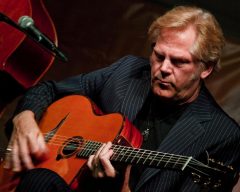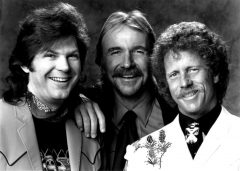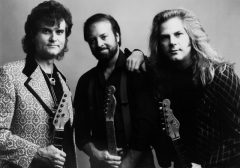Yesterday And Today
John Jorgenson: Musical Gypsy from the New World
John Jorgenson belongs to that rare breed of artist whose musicality transcends genres. While primarily known as a guitarist, his mastery also extends to the piano, mandolin, mandocello, dobro, pedal steel, upright bass, clarinet, bassoon, and saxophone. Given the many facets of his musical abilities, he is highly sought-after as a collaborator and accompanist for many high-profile performers. Throughout his multifaceted career he has brought his unique musical artistry to the performances and recordings of such notables as Bonnie Raitt, Bob Seger, Earl Scruggs, Bob Dylan, Barbra Streisand, Luciano Pavarotti, and Elton John. He has been nominated for the Grammy Award numerous times, and in 2008 he won for Best Instrumental Country Performance. His solo projects showcase his depth as a composer of original material as well as his ability to interpret others’ work with insight and emotion.
Shortly after his birth in Madison, Wisconsin, his family relocated to Redlands, California, where his interest and aptitude in music became evident. He points out, “My parents were both musicians but actually made their living as music teachers. My father was a college music professor and my mother a private piano teacher. They both felt compelled to direct me toward the more “stable” environment of the teaching profession, but that was not at all my calling. Once they realized I would not be deterred they were supportive of my career choices for the most part. There was really no question in my mind that music would be my life’s work.” Indeed, his mother began giving him piano lessons at the age of five. He started learning the clarinet at eight, and it was also around this time that his interest in the guitar was sparked after seeing the Beatles on the Ed Sullivan Show. It took some effort to persuade his parents to get him a third instrument, but eventually they relented. It was a decision that would have far-reaching consequences. While majoring in woodwind performance (bassoon, clarinet, and saxophone) at the University of Redlands, the guitar gave him a fun outlet for playing rock with his friends, and it turned into a significant tool of his trade. Versatility and virtuosity became essential early in his performing career. He found work as a musician at Disneyland, playing in three different bands that featured himself and the same bandmates changing costumes to fit whatever the setting required. In a Dixieland group called the Main Street Maniacs he played the clarinet and saxophone. The Thunder Mountain Boys were a bluegrass band that showcased his then-nascent mandolin skills. Foreshadowing his later excursions into gypsy jazz, he played guitar in a swing group called the Rhythm Brothers. The pattern for his life was set, as he declares, “My life has always been multiple instruments, multiple musical styles, and that’s actually kind of when I’m the happiest, when I get to do a lot of different stuff.”
Lovers of gypsy jazz, the energetic, vibrant style of music that originated in France in the 1930s, are in for a major treat when the John Jorgenson Quintet comes to town on January 24. Jorgenson assembled an outstanding lineup of virtuoso musicians in 2004 with the aim of bringing gypsy jazz to modern audiences. Currently featuring violinist Jason Anick, guitarist Max O’Rourke, bassist Simon Planting and percussionist Rick Reed, this ensemble authentically channels the sound and spirit of such Hot Club pioneers as Django Reinhardt and Stephane Grapelli. Jorgenson plays guitar, clarinet, and bouzouki in the group. While he is nominally the leader and focal point, he takes obvious pride and delight in letting each player shine during their solo spots. Whatever the music calls for, they are capable of playing with both precision and spontaneity. While the group ably executes standards in the repertoire, they are also bringing the genre forward with original compositions whose arrangements and sound dovetail seamlessly with the work of the masters. Such is their reputation for authenticity, they were tapped to recreate the music of Reinhardt in the movies Gattaca and Head in the Clouds, with Jorgenson actually portraying Reinhardt in the latter film. They are also the only American act to headline the Django Reinhardt Memorial Festival in France, and have been featured at various Django fests in the US, UK, Germany, and Canada.
After his initial exposure to gypsy jazz, Jorgenson has embraced it wholeheartedly. He became a voracious student whose explorations into the genre included traveling to the places of its origin and meeting with many prominent players. He half-jokingly describes his journey as “an archaeology project.” Because it is a style of guitar-based music with different cultural origins than blues and rock, which American ears are accustomed to, he spent many years of study and practice “cracking the code,” learning not only the techniques, but also trying to achieve the mindset of the art’s practitioners. He has authored a pair of books, which he hopes will facilitate the efforts of others seeking to appreciate and play it. “Gypsy jazz captured my imagination when I first heard it decades ago, and the same elements still excite me: the passion, emotion, forward motion and energy, melody, rhythm—it is a vital style of music that carries equal parts of feeling with virtuosity. Listening tends to be more of an active experience than a passive one, and at the end of a concert the band and audience become one, ideally.”
In a recent interview he relates how his fascination with gypsy jazz was the catalyst for a significant turning point in his career. While attending a trade show for the National Association of Music Merchants (NAMM), he introduced himself to famed mandolinist David Grisman, and they both expressed an admiration for Django Reinhardt. Because Jorgenson was carrying a gypsy jazz guitar, an impromptu jam took place. “As we were playing, Chris Hillman [the Byrds, Flying Burrito Brothers, Manassas] and Al Perkins walked up. At that time Chris Hillman had heard my name from mutual friends but he had never met me. So the first time he sees me I’m jamming with David Grisman, which gives me instant credibility. Even though I’d met him only seconds before! But I ended up playing with Chris, then a couple months down the road we started the Desert Rose Band together. We got a record deal and started getting number one records in country, and then the producers of that band started using me for other projects and I ended up playing on records with Bonnie Raitt, Bob Seger, and Bob Dylan. At some point Elton John came to see our band at the Roxy and a number of years later he called me to tour with him!”
Shortly after its formation in 1985, the Desert Rose Band scored some major successes, including chart-topping singles and five well-received albums. Fronted by Hillman, Jorgenson was mainly responsible for the instrumental arrangements while Herb Pedersen worked out the vocal parts. Although they started playing acoustically, Jorgensen felt that some of the songs Hillman brought to the band were more suited to an electric arrangement. In his words, “I had a sound in my mind that was equal parts the Pretenders and Bill Monroe.” By combining bluegrass harmony with classic British pop guitars, they played a huge part in creating the definitive sound of country rock. They scored number one hits with “He’s Back and I’m Blue” in 1987 and then again the following year with “I Still Believe in You.” A good number of their other releases were also warmly welcomed by the listening public, with many placing in the top ten. The band earned three Country Music Association awards as well as two Grammy nominations. Jorgenson himself was twice lauded as “Guitarist of the Year” by the Academy of Country Music during his tenure with the band. He left in 1991 and the band officially ceased operation in 1994, though they have reunited on occasion, the first time taking place in Solana Beach at the Belly Up on August 27, 2008.
Jorgenson recently spoke about the rather impromptu origin of the Hellecasters, an award-winning guitar-centric group with noted players Will Ray and Jerry Donahue. He tells of a venue in North Hollywood called the Palomino Club, which hosted a weekly show called The Barndance. The show typically featured local talent performing short sets in the American roots genre. “It was usually a singer that would come and do a mini set of three or four songs.” As he was already friends with Ray and had been introduced to Donahue, they put their heads together and asked themselves, “Why don’t we do something where the guitars are the singers instead of back up singers all the time? Let’s do like ‘The Three Tenors of Electric Guitar’ or ‘Three Dog Night’ but with guitars! One would immediately think they’re gonna do blues jams or chicken picking or whatever… and I thought we should up the game a little bit and play songs! You know, more like how the Shadows did or the Ventures—great instrumental groups of the past.” Each musician came up with songs to play and on a June evening in 1990 they delivered a memorable set that generated a tremendously enthusiastic response. People were clamoring to find out when and where their next gig was going to be. Even though they didn’t consider themselves a real band at this point, this one-off performance developed into follow-up shows as their schedules permitted. “It was maybe [at] our second or third show that [ex-Monkee] Michael Nesmith came and saw us, and he was starting a label [Pacific Arts Audio] at the time. And he said, ‘I’ve got a label for my own records but I’d like to have you guys record for my label,’ so we said okay. So we had to get a little more serious and get enough songs for an album, and then that album was voted number one album of the year in Guitar Player magazine, both in overall and in country, and we were pretty blown away because it was just something we started as fun.”
Jorgenson’s career took an incredible upward turn shortly after the release of the Hellecaster’s second album, Escape From Hollywood, when he received a call from none other than Sir Elton John. While plans were in the works to start promoting the new album, this was an opportunity not to be missed. What started as a commitment to an 18 month-long tour turned into a six-year tenure. He performed and recorded with the rock superstar from 1995 to 2001, playing guitar, saxophone, and providing backing vocals. He had also appeared in the lineup in 2006 and 2013. An unfortunate turn of events during Sir Elton’s recent Farewell world tour turned into another opportunity when he was asked to step into an ailing Davey Johnstone’s role as lead guitarist. Johnstone, who also serves as the band’s musical director, had suffered a shoulder injury requiring surgery and an extended convalescence, and Jorgenson was the natural choice to fill the vacancy. While Johnstone’s musical virtuosity and trademark long blond locks are an integral part of every Elton John stage performance, Jorgenson made sure that the music stayed true to what audiences had come to expect from the rock icon.
Years as a collaborator and an accompanist have given Jorgenson the experience and skill to assume the role of band leader when he pursues his many projects. “If I’m leading a band or a project I like to have a clear vision, and it’s up to me to choose the musicians who can deliver their parts of that vision. Hopefully, the players will bring more to the table and I like to allow the players the freedom to express their own styles within the ensembles, but at the end of the day if they are my compositions and my vision I will have the final say in terms of arrangement and dynamic. The most important quality in one of my band members is the ability to roll with the punches and deal calmly with situations that can be less than ideal with regard to travel, and sometimes playing conditions. Any stresses and conflicts need to be kept away from the audience’s experience!” The results of this approach are incendiary performances that leave both players and audiences satisfied. On stage it can plainly be seen that the musicians enjoy their ensemble playing as much as they do their solo spots.
Jorgenson currently has five different ensembles in varying stages of activity. “Obviously the Quintet is performing live quite often, and there will be some new recording coming up in early 2020 for that group. The John Jorgenson Bluegrass Band (J2B2) will be performing throughout 2020 as well. The John Jorgenson Electric Band (JJEB) tours in Europe once or twice each year. JJ, DD, and MM is a collaboration with Dennis Diken and Mike Mesaros from the Smithereens. Songs we recorded last year will be released on a CD called East Meets West in early 2020. Hooker, John, and Harry is a vocal trio with Beth Hooker and Harry Stinson that performs sporadically around Nashville, depending on schedules. We have recorded a few tracks for a new label in Nashville to be released later in 2020.” His calendar is also filled with recording dates, and there are some upcoming releases to look forward to. “There is an instrumental album with Joe Bonamossa coming out in January called Easy to Buy, Hard to Sell and billed to the Sleep Easies, and I will be doing some recording in February with blues/rock guitarist Davy Knowles and some new acoustic music with Sam Bush and others for a Robben Ford-helmed label…. always lots on the horizon. There is also a monthly web series called The Guitarist that will feature me and many of my friends talking about and playing music together, available to watch at www.americanmusical.com”
Through it all, Jorgenson never loses sight of the reason he was called to his vocation. He states with confidence that music was always destined to play a large part in his life. “I’d be playing music regardless of the fame level—in professional or semi-pro groups, I would imagine. Growing up, pretty much everyone I knew played music.” The satisfaction of creating music and performing it for audiences is a constant in his existence. A lifetime spent on the road and in studios has given him a seasoned veteran’s perspective on the whole process. When asked if performing provides the same exhilaration that it did when he started, he replies, “I can’t say it’s exactly the same because I’ve had so many ‘firsts’ over my long career, and those, of course, are special [first TV appearance, first number one record, first Grammy, first Carnegie Hall performance, etc.] but each performance takes on its own importance, as with experience I’ve seen how things can go wonderfully and also go awry, so I truly appreciate each chance to create magic with a receptive audience and a great musical unit.”
The John Jorgenson Quintet will perform on Friday, January 24, as part of the AMSD concert series. Visit http://amsdconcerts.com/ for tickets and information.













